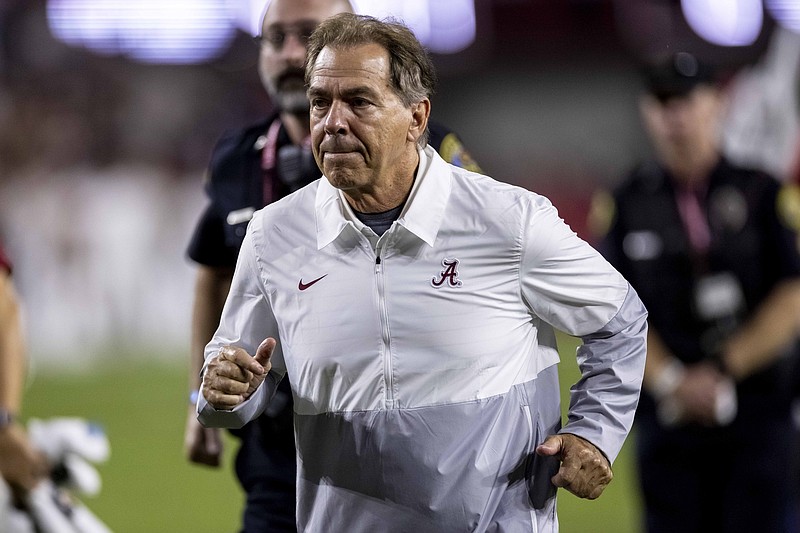The Southeastern Conference's scheduling model for football is so entrenched that most fans could piece it together with ease: Eight SEC games, a Football Championship Subdivision opponent at home and a couple of other nonconference matchups - perhaps with a traditional rival mixed in.
How long that tried and true formula can last is the question. The SEC will add Oklahoma and Texas to its membership no later than July 2025, and there could be more expansion.
"I think the SEC needs to expand its conference games for sure," said former Vanderbilt quarterback Jordan Rodgers, now an analyst for the SEC Network.
The SEC season is already a pressure cooker of eight conference games in which a team's championship fortunes can be upended in any given week. Now the league might add to the gauntlet.
Tim Tebow, the former Florida quarterback who won the 2007 Heisman Trophy and two BCS national championships with the Gators, isn't sure how that shakes out. Now an ESPN analyst, he sees the importance of facing usually overmatched teams from the FCS in order for SEC teams to find a rhythm. But from a fan's perspective, he wants more matchups like the Top 25 showdown this month in which Auburn traveled to Penn State for a rare SEC at Big Ten game during the regular season.
"If I'm (an athletic director) at an SEC school, I'm like, 'I already have to play an SEC schedule. Are you kidding me?" he said of the prospect of adding more conference games.
Continued Tebow: "I'm getting as many directional schools as I can" on the schedule.
It's a tricky balancing act when it comes to making a football schedule. When teams play other Power Five teams, it can be a springboard for success or blunt a promising season.
In the SEC, Georgia gained momentum and buzz with its 10-3 victory over Clemson in Charlotte, North Carolina, to start the season. (The Bulldogs entered the season ranked fifth and are now No. 2; Clemson, which now has a second loss, has tumbled from third to 25th.) Two weeks later, No. 22 Auburn fell in a drama-filled visit to 10th-ranked Penn State, 28-20. (The Nittany Lions have risen to No. 4, while Auburn has held on near the bottom of the rankings.)
The Power Five leagues - the SEC is joined by the Atlantic Coast Conference, Big 12, Big Ten and Pac-12 in that quintet - doles out hefty paydays for what's usually an easy victory against so-called cupcake teams from the FCS. Every SEC team has one on the schedule this season.
The AP surveyed SEC schools and found that 13 of the 14 programs will pay a combined $6.55 million in guarantees for such games. Only Arkansas would not reveal what it will pay, meaning the total SEC payout is closer to $7 million.
The contests, which often look more like scrimmages, are helpful for the SEC teams and their fans. Football teams iron out wrinkles from preseason camp, and reserves who won't see the field once conference play starts can receive significant playing time. On top of that, home fans likely stream from packed stadiums satisfied with a blowout victory.
Sometimes, things don't work out. Vanderbilt paid East Tennessee State $415,000 to open the season and lost to the Southern Conference's Buccaneers 23-3.
Rodgers believes the league must rethink its scheduling. More SEC games are needed in a super-sized, 16-team league, the SEC Network analyst said. He also said uniformity in scheduling nonconference games could squeeze out the FCS, ending one of the primary revenue streams such schools have in funding athletics.
"We're on the cusp of college football as a whole changing completely," Rodgers said. "I think we thought that it was behind us: 'Look, Texas and Oklahoma are here, let's all take a breath.' No, no, no, it's only going to get crazier."
The SEC only has to look at last year for a possible solution. The COVID-19 pandemic led the league to an all-SEC, 10-game schedule in 2020. The SEC played all but two regular-season games as scheduled, and league champion Alabama went on to win the sixth national championship in coach Nick Saban's tenure.
"You know, we played 10 SEC games last year. I thought it was great for fans. I thought it was great for the matchups," said Saban, long an advocate for more SEC games.
Georgia coach Kirby Smart, a former Saban assistant, is also backing more SEC games because he said it's "good for the league."
If the SEC holds on to its eight-game league schedule with 16 teams, it could mean only one cross-divisional game. That means pairings such as Alabama-Florida might happen in the regular season just once a decade.
But additional conference games could affect facing FCS teams, opponents from the Football Bowl Subdivision's Group of Five leagues and tradition Power Five rivalry games such as Florida-Florida State, Georgia-Georgia Tech or South Carolina-Clemson that cap the schedule.
The coronavirus eliminated those contests last year. College football's changing landscape might do the same.
"The model is going to continue to change," Rodgers said. "So buckle up."
